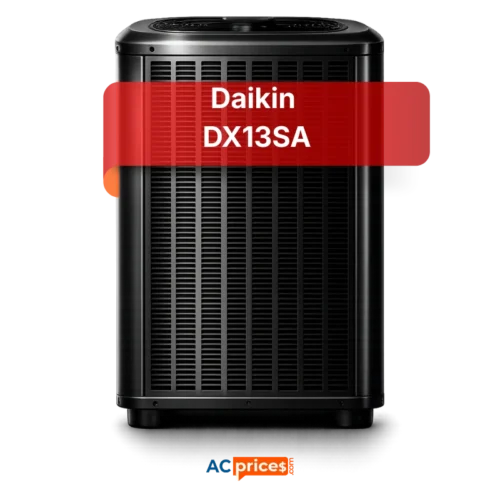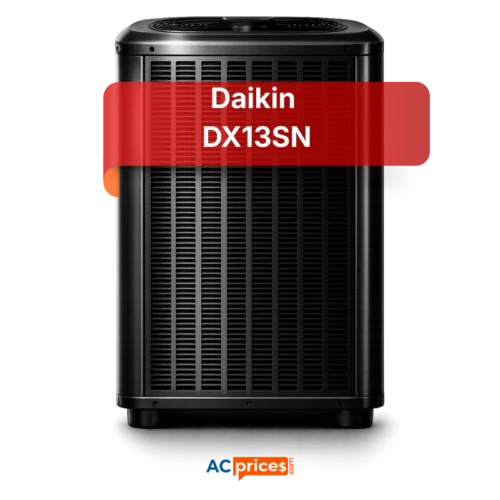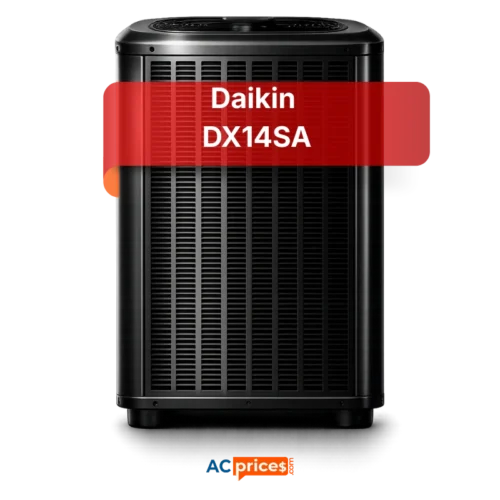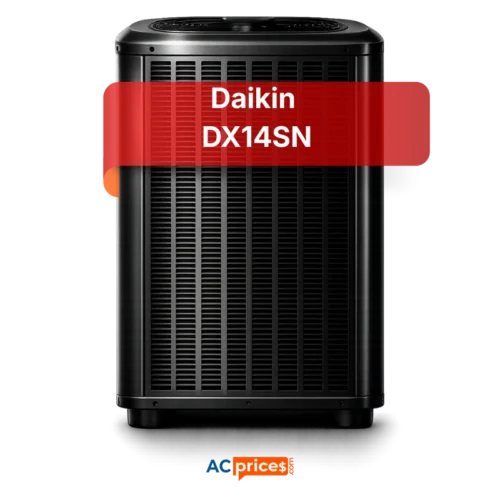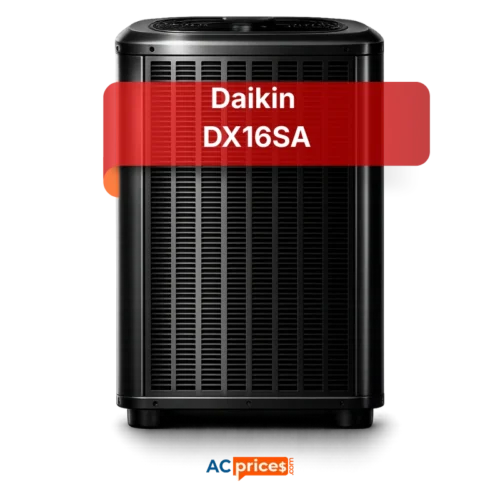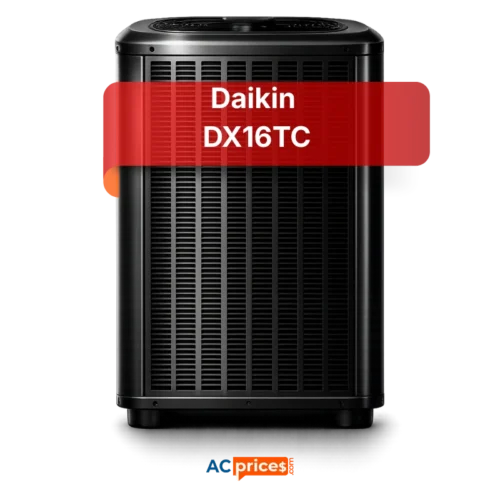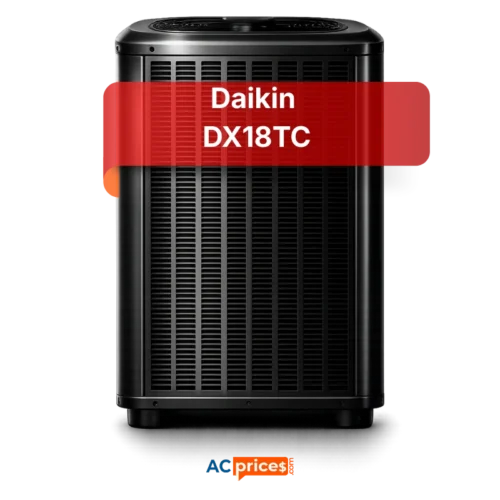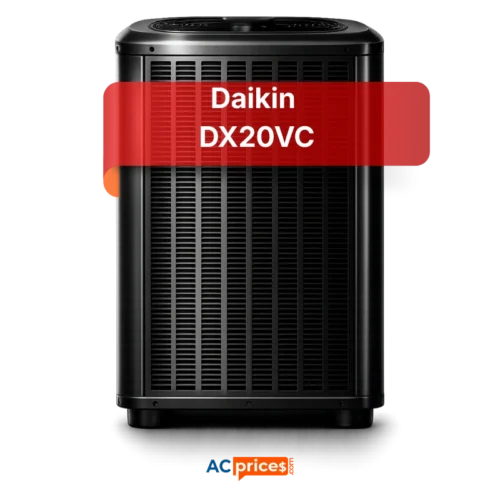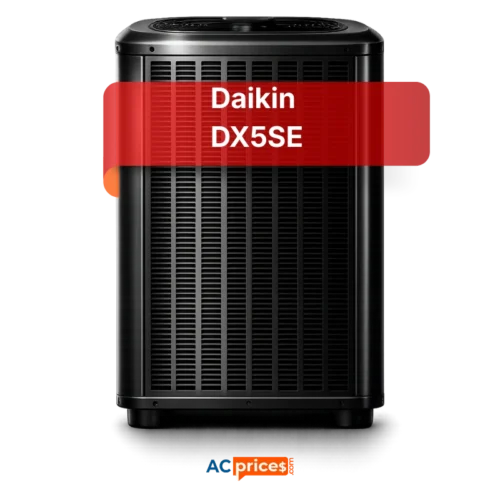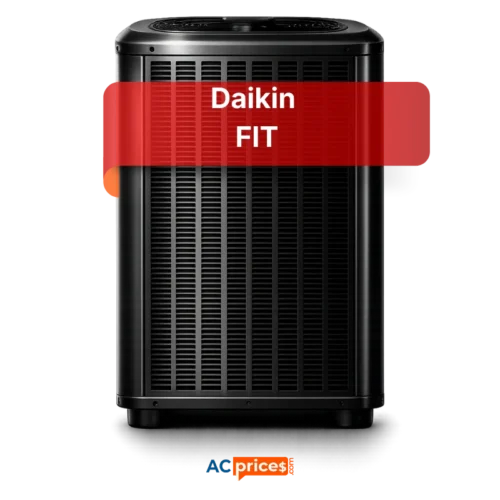![]()
1M+ Canadians have relied on our services and advice
Daikin Air Conditioner Review & Buying Guide
Get a free no-obligation quote from our reliable top 1% vetted certified local partners to repair or install a Daikin Air Conditioner.
15,000+
Daikin
4.6
Average Rating By Homeowner
$5,500
Average Price Including Installation
Daikin Air Conditioners At a Glance
Strengths
Areas for Improvement
Daikin Air Conditioner Review
Your complete guide to Daikin air conditioners—covering top models, pricing, SEER ratings, standout features, warranty details, and more.
In this review, we’ll explore Daikin’s pros and cons, outline their model tiers, compare all current options, explain exclusive features, evaluate warranty coverage against competitors, and share what real Canadian homeowners and HVAC dealers think about the brand.
Upgrading your air conditioner is more than just an investment in cooling—it can lower energy bills, improve indoor air quality, provide more consistent comfort throughout your home, and give you better control over your system.
Of course, with so many brands and models available, choosing the right unit can be time-consuming and overwhelming.
That’s why we’ve created this comprehensive guide—to give you everything you need to know about Daikin air conditioners, including available models, key features, efficiency ratings, and what makes them stand out.
Also Read: The Best Central Air Conditioners for Canadians
Bottom Line
A Daikin air conditioner is a smart choice if your priorities include efficiency, reliability, quality, and overall value.
With a wide range of models, Daikin offers solutions to fit nearly any Canadian household. While their systems may not feature some of the latest high-tech innovations found in other brands, they consistently deliver solid performance backed by thoughtful design and durable components.
Every Daikin air conditioner comes equipped with quality features and is supported by one of the industry’s stronger warranties—even on entry-level models.
Though Daikin units are priced slightly higher than budget brands, they remain very affordable compared to premium competitors. Plus, choosing a high-efficiency ENERGY STAR® model can qualify you for rebates, helping offset costs while ensuring long-term energy savings. For the investment, you’ll get a well-built, efficient air conditioner designed to provide comfort and reliability for years to come.
Daikin Air Conditioner Model Series Overview
Value Tier: Single-Stage Models
Daikin Air Conditioner models in the value-tier range—identified by model numbers ending in SA and SN—are budget-friendly systems that balance affordability with quality and reliability.
These Daikin Air Conditioner units are single-stage systems with SEER ratings between 14.5 and 16. Only the 16-SEER model carries ENERGY STAR® certification, while the others are mid-efficiency units that may not provide the same long-term energy savings but still offer solid performance.
Mid-efficiency single-stage Daikin Air Conditioner models may not be ideal for larger homes or high-demand cooling spaces, as they can struggle to maintain consistent comfort at a low operating cost. However, when matched correctly to the right home size, they provide excellent efficiency and help lower energy bills compared to older systems.
Even as entry-level options, each Daikin Air Conditioner is built with durability in mind—engineered to handle harsh weather, operate quietly, and backed by strong warranty coverage, ensuring lasting value and comfort for homeowners.
Premium Tier: Two-Stage and Variable-Speed Models
Unlike some HVAC brands that divide products into three categories, Daikin air conditioners are best grouped into value and premium tiers.
The premium-tier models include two-stage and variable-speed systems, with SEER ratings ranging from 17 to 24.5. Most are ENERGY STAR® certified, making them eligible for rebates that help offset their higher upfront cost. These systems are built to deliver superior energy efficiency, lower summer cooling bills, and meet even the toughest cooling demands of Canadian homes.
Premium-tier units not only include the same durable design features as the value-tier models but also offer:
- Compatibility with advanced diagnostics systems
- Integration with the Daikin One+ smart thermostat
- Enhanced noise-reduction technologies
- More comprehensive warranty coverage
Model Breakdown and Comparison
To make it easier for homeowners to compare models, Daikin air conditioners are often rated using two key measures:
- Warranty Grade – Assesses warranty terms, exclusions, and fine print to help you understand coverage without having to sort through dense legal documents.
- Overall Grade – Weighs efficiency, features, and warranty strength together to create an easy-to-understand performance score.
It’s worth noting that a lower grade doesn’t necessarily mean a poor-quality product. Entry-level systems tend to score lower because they lack advanced features, but they can still be the most cost-effective choice for many households. In the same way, a high-performance model may score better overall but comes with a higher price tag—similar to how a sports car might outperform a minivan but isn’t always the best fit for the average family.
| Model | SEER Efficiency Rating | ENERGY STAR® | Compressor Type | Noise Level (dB) | Warranty Grade | Overall Grade |
|---|---|---|---|---|---|---|
| AVXC20 | 24.5 | ✅ Yes | Variable Speed | 59 – 75 | A+ | A+ |
| ASXV9 | 22.5 | ✅ Yes | Variable Speed | 71 – 75 | A+ | A |
| ASXC18 | 19 | ✅ Yes | Two-Stage | 68 – 74 | A+ | A- |
| ASXC7 | 17.2 | ✅ Yes | Two-Stage | 71 – 75 | A+ | A- |
| ASXC16 | 17 | ✅ Yes | Two-Stage | 70 – 74 | A+ | A- |
| ASXS6 (S-Series) | 17.2 | ✅ Yes | Variable Speed | 66 – 74 | A+ | B+ |
| ASX16 | 16 | ✅ Yes | Single Stage | 71.5 – 73 | A+ | B+ |
| ASXH5 | 15.2 | ✅ Yes | Single Stage | 71 – 76 | A+ | B+ |
| ASX14 | 15 | ❌ No | Single Stage | 70 – 71 | B | C |
| ASX13 | 14 | ❌ No | Single Stage | 73 – 77 | B | C |
| ASXH4 | 14.3 | ❌ No | Single Stage | 71 – 76 | B | C |
| ASXH3 | 13.4 | ❌ No | Single Stage | 68 – 73 | B | C |
| ANX14 | 15 | ❌ No | Single Stage | 71 – 74 | B | D |
| ANX13 | 14 | ❌ No | Single Stage | 71 – 77 | B | D |
| ASXN4 | 14.3 | ❌ No | Single Stage | 71 – 75 | B | D |
| ASXN3 | 13.4 | ❌ No | Single Stage | 70 – 76 | B | D |
Daikin Fit
🔗 Read Full Daikin Fit Review
The Daikin Fit is a compact, space-saving system designed for easy installation with existing ductwork, making it ideal for smaller homes. It combines affordability with durability and uses a variable-speed compressor with inverter technology to deliver efficient, consistent cooling while lowering energy bills.
A self-diagnostic control board simplifies maintenance and troubleshooting, while compatibility with the Daikin One+ smart thermostat allows Wi-Fi access and remote control from anywhere. Additional features help minimize noise, protect against damage, and extend the system’s lifespan.
- Compressor: Variable-speed swing
- SEER: Up to 18
- ENERGY STAR®: ❌ No
- Decibels: As low as 57
- Tier: Premium
- Best For: Homeowners seeking an efficient, quiet, and compact system to reduce hot/cold spots, manage humidity, and cut energy costs. Lack of ENERGY STAR may limit rebate eligibility.
Daikin DX20VC
🔗 Read Full Daikin DX20VC Review
The DX20VC is Daikin’s most efficient air conditioner, with a 24.5 SEER rating that earned the ENERGY STAR Most Efficient award. It uses a variable-speed compressor with inverter technology to virtually eliminate temperature swings, paired with a quiet ECM condenser fan motor for smooth, efficient operation.
Its durable powder-coated finish protects against UV damage, and the self-diagnostics system streamlines maintenance. While extremely efficient, it may be more powerful—and more expensive—than most Canadian households require.
- Compressor: Variable-speed swing/scroll
- SEER: Up to 24.5
- ENERGY STAR®: ✅ Yes
- Decibels: As low as 57
- Tier: Premium
- Best For: Homes in hotter climates (e.g., Southern U.S.) with long cooling seasons. Likely overpowered and costly for most Canadian homes.
Daikin DX18TC
🔗 Read Full Daikin DX18TC Review
A premium two-stage model, the DX18TC offers excellent efficiency (up to 19 SEER) and consistent comfort. Its Copeland UltraTech two-stage scroll compressor ensures quieter operation, fewer temperature swings, and improved humidity control.
It was recognized as an ENERGY STAR Most Efficient unit and includes Copeland CoreSense self-diagnostics, an efficient ECM motor, and compatibility with the Daikin One+ thermostat. Backed by Daikin’s strong warranty, it’s reliable but may provide more power than most Canadians need.
- Compressor: Two-stage scroll
- SEER: Up to 19
- ENERGY STAR®: ✅ Yes
- Decibels: As low as 68
- Tier: Premium
- Best For: Canadians with higher cooling demands who want efficient, quiet operation, rebate eligibility, and reliable long-term performance.
Daikin DX16TC
🔗 Read Full Daikin DX16TC Review
Often considered Daikin’s best value, the DX16TC offers two-stage efficiency at an affordable price. With a SEER of up to 17, it hits the sweet spot for Canadian climates—efficient enough for rebates while keeping costs reasonable.
It features a two-stage scroll compressor, quiet design, excellent warranty, and compatibility with the Daikin One+ thermostat. The DX16TC is powerful enough for most homes while keeping energy costs low.
- Compressor: Two-stage scroll
- SEER: Up to 17
- ENERGY STAR®: ✅ Yes
- Decibels: As low as 70
- Tier: Premium
- Best For: Homeowners wanting maximum value—great efficiency, rebates, quiet operation, and long-term savings without overspending.
Daikin DX16SA
🔗 Read Full Daikin DX16SA Review
The DX16SA is Daikin’s top value-tier model, offering up to 16 SEER efficiency and ENERGY STAR certification. It uses a reliable single-stage scroll compressor, a sound-control top, and Copeland CoreSense self-diagnostics for easy monitoring.
Durable and affordable, it balances cost, efficiency, and features, making it a strong choice for homeowners looking to save on bills without jumping to premium pricing.
- Compressor: Single-stage scroll
- SEER: Up to 16
- ENERGY STAR®: ✅ Yes
- Decibels: As low as 71.5
- Tier: Value
- Best For: Budget-conscious buyers who still want rebates, efficiency, and warranty-backed performance.
Daikin DX14SA
🔗 Read Full Daikin DX14SA Review
An entry-level model with a 15.5 SEER, the DX14SA is slightly more advanced than Daikin’s most basic options. It includes self-diagnostics, sound-reduction features, and a strong warranty, but lacks ENERGY STAR certification.
Its efficiency rating means smaller savings and lower rebate eligibility, making it better suited for smaller homes or milder climates.
- Compressor: Single-stage scroll
- SEER: Up to 15.5
- ENERGY STAR®: ❌ No
- Decibels: As low as 70
- Tier: Value
- Best For: Smaller spaces or mild climates where extreme cooling isn’t required, but homeowners still want a reliable unit.
Daikin DX14SN
🔗 Read Full Daikin DX14SN Review
One of Daikin’s more affordable options, the DX14SN delivers 15.5 SEER with a single-stage PSC fan motor. It lacks ENERGY STAR certification but still offers solid durability and a strong warranty.
While not as efficient as premium models, it’s a practical option for smaller homes or regions with moderate summers.
- Compressor: Single-stage
- SEER: Up to 15.5
- ENERGY STAR®: ❌ No
- Decibels: As low as 71
- Tier: Value
- Best For: Homeowners who want a reliable, low-cost cooling solution without premium features.
Daikin DX13SA
🔗 Read Full Daikin DX13SA Review
The DX13SA is Daikin’s most basic and affordable air conditioner. With single-stage operation and a 14.5 SEER, it won’t qualify for rebates and offers modest energy savings.
That said, it’s still a durable unit with design elements to extend lifespan, backed by Daikin’s strong warranty. It’s best suited for smaller homes or areas with mild summers.
- Compressor: Single-stage scroll
- SEER: Up to 14.5
- ENERGY STAR®: ❌ No
- Decibels: As low as 71
- Tier: Value
- Best For: Budget-conscious buyers in smaller spaces who want dependable cooling at the lowest upfront cost.
Daikin DX13SN
Read Full Daikin DX13SN Review
The Daikin DX13SN is a straightforward, entry-level air conditioner built for homeowners who don’t need advanced features or ultra-high efficiency. It operates with a basic single-stage compressor and a single-speed condenser fan motor, paired with a mid-efficiency SEER of 14.5. Since it isn’t ENERGY STAR certified, this model won’t qualify for most high-efficiency rebates and is best suited for smaller homes or regions with milder summers.
That said, the DX13SN still provides solid value for its category. It’s affordable, backed by Daikin’s industry-leading warranty, and designed with self-diagnostic technology and durability-enhancing features that help extend the system’s lifespan. While it may not meet the demands of larger homes or humid climates, it can be an excellent option for homeowners seeking a reliable cooling solution on a budget.
- Compressor: Single-stage
- SEER: Up to 14.5
- ENERGY STAR Certified: No
- Decibel Rating: As low as 73
- Tier: Value
Ideal for: Budget-conscious Canadians who want a dependable air conditioner for a smaller home or moderate climate. If you don’t require premium features or high-efficiency performance, the DX13SN offers a reliable, warranty-backed solution at an affordable price.
Daikin’s Quietest Air Conditioners
Modern air conditioners are becoming quieter thanks to advanced engineering and design improvements. Daikin places strong emphasis on noise reduction by integrating features such as:
- Compressor sound blankets made of high-density acoustic foam
- Sound-control tops on outdoor units
- Scroll, two-stage, and variable-speed compressors that naturally run quieter than traditional single-stage designs
- Multi-speed condenser fan motors that help minimize operational noise
As a result, Daikin’s premium-tier models deliver some of the lowest sound levels on the market. Their quietest systems include:
- Daikin Fit – As quiet as 57 decibels
- Daikin DX20VC – As quiet as 57 decibels
- Daikin DX18TC – As quiet as 68 decibels
For perspective, 60 decibels is about the same as a normal conversation or soft background music. This means Daikin’s quietest models can keep your home comfortable without adding disruptive noise.
Exclusive Features from Daikin
Daikin Inverter Technology
How Daikin describes it: Inverter technology ensures steady comfort without the uncomfortable temperature swings common with traditional non-inverter HVAC systems.
Plain explanation: Think of inverter technology like cruise control for your air conditioner. Instead of turning on and off at full speed, the inverter adjusts the compressor’s motor speed to match your home’s cooling needs. This allows the system to respond to changes in temperature and humidity in real time, delivering consistent comfort while using less energy.
Why it matters:
- Steadier indoor temperatures
- Improved efficiency and energy savings
- Reduced wear and tear on the system
Is it more than hype? Yes. Variable-speed systems with inverter technology are among the most efficient and reliable on the market. However, Daikin isn’t the only brand offering this—Toshiba first introduced it in the 1980s, and now it’s widely available across brands from economy (Goodman, KeepRite) to premium (Lennox, Carrier).
Daikin One+ Smart Thermostat
How Daikin describes it: A cloud-connected, intelligent home air controller for managing temperature, humidity, and air quality.
Plain explanation: The Daikin One+ is essentially a smart thermostat with advanced features. It’s Wi-Fi enabled, meaning you can control your HVAC system remotely from anywhere. It also goes beyond standard thermostats with options like:
- Comfort scheduling
- Away and vacation energy-saving modes
- Geofencing (adjusts comfort based on your phone’s location)
- Indoor air quality monitoring and optimization
Is it more than hype? Yes—but not unique. Smart thermostats have been shown to cut energy consumption by optimizing heating and cooling patterns. Still, Daikin isn’t the only player here. Carrier, Lennox, Rheem, and others have their own proprietary models, and universal options like Nest or ecobee often work with a wider range of systems.
👉 Key consideration: If your furnace isn’t compatible with Daikin One+, you may need separate thermostats for heating and cooling—something a universal thermostat could avoid.
Copeland CoreSense Diagnostics
How Daikin describes it: Advanced technology that monitors the system, detects problems, and simplifies troubleshooting.
Plain explanation: CoreSense Diagnostics is a built-in monitoring module that tracks system performance. If something goes wrong, it uses LED fault codes to give HVAC technicians a quick, accurate idea of the issue.
Why it matters:
- Faster, easier repairs
- Lower service costs
- Less downtime without cooling
Is it more than hype? It’s genuinely useful, but not exclusive. Goodman and Amana—also owned by Daikin Global—offer similar self-diagnostic technology.
Warranty Analysis
Daikin Warranty Coverage
All Daikin air conditioners come with:
- 12-year parts limited warranty
- Unit replacement warranty (length varies by model)
Unit Replacement Warranty by Model:
- 2 years: DX13SN, DX14SN
- 6 years: DX13SA, DX14SA, DX16SA
- 12 years: DX16TC, DX18TC, DX20VC, Daikin Fit
This coverage means if your compressor fails during the replacement period, Daikin will provide an entirely new system—not just repair parts.
Registration Requirements
To get the full registered warranty, you must register your system with Daikin within 60 days of installation.
Without registration:
- Parts coverage drops from 12 years to 5 years
- No unit replacement warranty
Registration process: Quick and simple online or by phone. You’ll need:
- Contact information
- Licensed HVAC installer details
- Installation date
- Serial and model numbers
Conditions & Restrictions
To keep your warranty valid, you must:
- Have the unit installed by a licensed HVAC professional
- Schedule annual maintenance with a licensed pro
- Use only manufacturer-approved replacement parts
- Follow operating guidelines in the manual
- Complete repairs promptly
- Reside in the home where the unit is installed
Failure to meet these conditions could void the warranty.
How Daikin’s Warranty Compares
Daikin’s 12-year parts warranty and unit replacement protection are among the strongest in the industry.
- Industry standard: 10-year parts warranty (Carrier, Heil, Rheem, Armstrong, Payne, Tempstar, etc.)
- Comparable or better coverage from other brands:
- Goodman & York: Lifetime compressor warranties
- Amana: Lifetime unit replacement warranties
- American Standard: 12-year compressor warranty + separate parts/coil coverage
- Comfortmaker & KeepRite: 10-year unit replacement warranties
Key takeaway: Daikin offers excellent warranty protection across all models, even entry-level units—something many competitors only provide for premium systems.
Is a Daikin Air Conditioner Right for You?
Is Daikin Within Your Budget?
Daikin falls into the mid-range price category. Some brands are cheaper, while others are more expensive.
In Canada, you can expect to pay between $3,000 and $6,000+ for a Daikin air conditioner, including installation. The final cost depends on factors such as:
- Model and cooling capacity
- Efficiency rating (SEER)
- Features included
- Your location and installation requirements
Basic, lower-SEER units will be the most affordable upfront but cost more to operate over time. Higher-SEER models cost more initially but offer better energy savings.
👉 On a tight budget? Consider economy brands like York, Goodman, or KeepRite.
👉 Want a premium option? Explore brands such as Carrier, Lennox, or Trane.
Will You Stay Long Enough to Benefit?
An air conditioner is an investment. You’ll save more over the years with a high-efficiency unit, thanks to:
- Lower energy bills
- Strong warranty coverage that reduces repair costs
However, if you plan to move soon, you may not benefit from these long-term savings. In that case, an entry-level model or an economy brand might make more sense.
Does Daikin Offer the SEER Rating You Need?
Daikin provides a wide SEER range:
- Entry-level: 14.5 SEER
- Mid-range: 16–18 SEER (best value for Canadian homes)
- High-end: Up to 24.5 SEER
In most parts of Canada, a 16–18 SEER model strikes the right balance between cost and efficiency. Models below 16 SEER may not deliver enough savings, while ultra-high-SEER models may not justify their higher price tag.
If rebates are important to you, Daikin has several ENERGY STAR® certified models that qualify.
Do They Have the Features You Want?
Air conditioners don’t come with as many “extras” as furnaces, but Daikin does offer:
- Sound-control tops & compressor blankets for quieter operation
- Durability-focused designs to extend lifespan
Other brands also offer unique features:
- Special coil designs – Lennox, Trane, American Standard
- Communicating systems – Amana, Goodman, Trane
- Climate customization – Coleman, Luxaire, York
- Built-in touchscreen controls – Coleman, Luxaire
If specific features matter to you, compare across brands before deciding.
Warranty Coverage
Daikin provides some of the best warranties in the industry, including:
- Longer-than-average parts coverage
- Unit replacement warranties on every model
Note: To keep your warranty valid, you’ll need professional installation and annual maintenance—standard requirements across all HVAC brands.
What Matters More Than Brand
While Daikin makes reliable systems, remember that a few parent companies own most HVAC brands. The brand name isn’t as important as:
- Choosing the right model for your home and budget
- Hiring a qualified HVAC contractor
A good dealer will ensure proper sizing, installation, maintenance, and help with rebates and warranty registration.
Daikin Add-ons and Extras
Smart Thermostats & Controls
- Daikin One+ Smart Thermostat
- Daikin Comfort Control App (control temperature, fan speed, and modes from anywhere)
Air Quality Solutions
- Media air cleaners – stronger than standard filters
- HEPA cleaners – capture up to 99.97% of particles as small as 0.3 microns
- Electronic cleaners – trap and neutralize contaminants
- UV air purifiers – sterilize mold, bacteria, and viruses
Moisture Control
- Humidifiers (evaporative for smaller homes, steam for larger/variable-speed systems)
- Dehumidifiers (remove 65–120 pints/day, improve comfort, and reduce A/C strain)
Ventilation (HRVs & ERVs)
- HRVs: Bring in fresh air while exhausting stale air
- ERVs: Do the same but also balance indoor humidity
About Daikin
Founded in 1924 in Japan, Daikin is one of the world’s largest HVAC manufacturers, with plants worldwide—including North America. Their focus: durable, efficient, and reliable air conditioning systems that keep homes comfortable through hot summers.
Daikin FAQs
Are Daikin air conditioners expensive?
They’re mid-range—typically $3,000 to $6,000+ installed. ENERGY STAR® models may qualify for rebates, making them more affordable over time.
What is the best Daikin model?
For Canadian homes, the top performers include:
- Daikin Fit (variable-speed)
- DX16TC (two-stage)
- DX16SA (single-stage)
All fall in the 16–18 SEER range, offering great balance between cost and efficiency.
Are Daikin air conditioners good quality?
Yes. Daikin is well-known for reliability, durability, and strong warranties. Their systems include features to improve efficiency, reduce noise, and extend lifespan.


